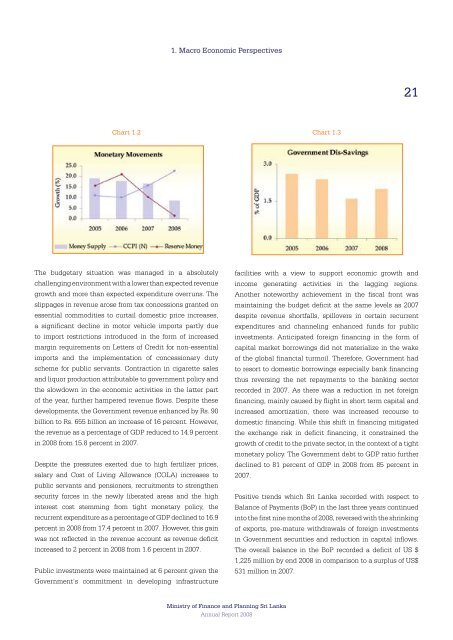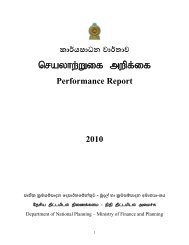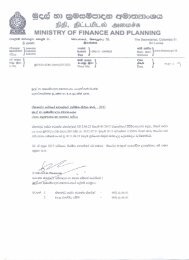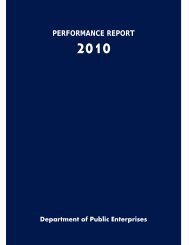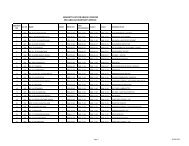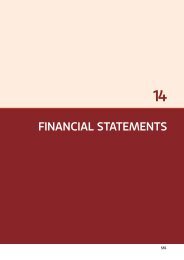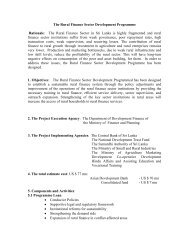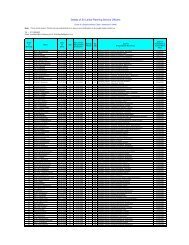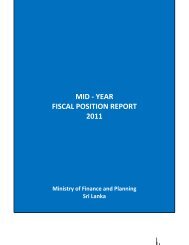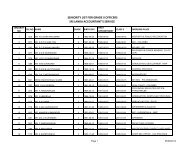Annual Report 2008 - Ministry of Finance and Planning
Annual Report 2008 - Ministry of Finance and Planning
Annual Report 2008 - Ministry of Finance and Planning
Create successful ePaper yourself
Turn your PDF publications into a flip-book with our unique Google optimized e-Paper software.
1. Macro Economic Perspectives<br />
21<br />
Chart 1.2 Chart 1.3<br />
The budgetary situation was managed in a absolutely<br />
challenging environment with a lower than expected revenue<br />
growth <strong>and</strong> more than expected expenditure overruns. The<br />
slippages in revenue arose from tax concessions granted on<br />
essential commodities to curtail domestic price increases,<br />
a significant decline in motor vehicle imports partly due<br />
to import restrictions introduced in the form <strong>of</strong> increased<br />
margin requirements on Letters <strong>of</strong> Credit for non-essential<br />
imports <strong>and</strong> the implementation <strong>of</strong> concessionary duty<br />
scheme for public servants. Contraction in cigarette sales<br />
<strong>and</strong> liquor production attributable to government policy <strong>and</strong><br />
the slowdown in the economic activities in the latter part<br />
<strong>of</strong> the year, further hampered revenue flows. Despite these<br />
developments, the Government revenue enhanced by Rs. 90<br />
billion to Rs. 655 billion an increase <strong>of</strong> 16 percent. However,<br />
the revenue as a percentage <strong>of</strong> GDP reduced to 14.9 percent<br />
in <strong>2008</strong> from 15.8 percent in 2007.<br />
Despite the pressures exerted due to high fertilizer prices,<br />
salary <strong>and</strong> Cost <strong>of</strong> Living Allowance (COLA) increases to<br />
public servants <strong>and</strong> pensioners, recruitments to strengthen<br />
security forces in the newly liberated areas <strong>and</strong> the high<br />
interest cost stemming from tight monetary policy, the<br />
recurrent expenditure as a percentage <strong>of</strong> GDP declined to 16.9<br />
percent in <strong>2008</strong> from 17.4 percent in 2007. However, this gain<br />
was not reflected in the revenue account as revenue deficit<br />
increased to 2 percent in <strong>2008</strong> from 1.6 percent in 2007.<br />
Public investments were maintained at 6 percent given the<br />
Government’s commitment in developing infrastructure<br />
facilities with a view to support economic growth <strong>and</strong><br />
income generating activities in the lagging regions.<br />
Another noteworthy achievement in the fiscal front was<br />
maintaining the budget deficit at the same levels as 2007<br />
despite revenue shortfalls, spillovers in certain recurrent<br />
expenditures <strong>and</strong> channeling enhanced funds for public<br />
investments. Anticipated foreign financing in the form <strong>of</strong><br />
capital market borrowings did not materialize in the wake<br />
<strong>of</strong> the global financial turmoil. Therefore, Government had<br />
to resort to domestic borrowings especially bank financing<br />
thus reversing the net repayments to the banking sector<br />
recorded in 2007. As there was a reduction in net foreign<br />
financing, mainly caused by flight in short term capital <strong>and</strong><br />
increased amortization, there was increased recourse to<br />
domestic financing. While this shift in financing mitigated<br />
the exchange risk in deficit financing, it constrained the<br />
growth <strong>of</strong> credit to the private sector, in the context <strong>of</strong> a tight<br />
monetary policy. The Government debt to GDP ratio further<br />
declined to 81 percent <strong>of</strong> GDP in <strong>2008</strong> from 85 percent in<br />
2007.<br />
Positive trends which Sri Lanka recorded with respect to<br />
Balance <strong>of</strong> Payments (BoP) in the last three years continued<br />
into the first nine months <strong>of</strong> <strong>2008</strong>, reversed with the shrinking<br />
<strong>of</strong> exports, pre-mature withdrawals <strong>of</strong> foreign investments<br />
in Government securities <strong>and</strong> reduction in capital inflows.<br />
The overall balance in the BoP recorded a deficit <strong>of</strong> US $<br />
1,225 million by end <strong>2008</strong> in comparison to a surplus <strong>of</strong> US$<br />
531 million in 2007.<br />
<strong>Ministry</strong> <strong>of</strong> <strong>Finance</strong> <strong>and</strong> <strong>Planning</strong> Sri Lanka<br />
<strong>Annual</strong> <strong>Report</strong> <strong>2008</strong>


